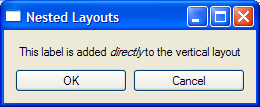Name
qaddlayout — add layout to another layout
Syntax
qaddlayout parentboxlayout childlayout [stretch]
qaddlayout parentgridlayout childlayout row column
qaddlayout parentgridlayout childlayout row column rowspan columnspan
Description
The qaddlayout command adds a layout to another layout according the layout policy of the receiving layout. This command is used when [nesting layouts].
Arguments
parentboxlayout
An instance of qhboxlayout or qvboxlayout. This is the layout that will contain the child layout to be added.
childlayout
The layout to be added to the parent layout. This can be any type of layout.
parentgridlayout
An instance of qgridlayout, acting as the receiving layout.
row
The row in the receiving qgridlayout where the child layout will be positioned.
column
The column in the receiving qgridlayout where the child layout will be positioned.
stretch
Stretch factor. An integer, this argument determines the layout's ability to stretch during resize. Use this to set preference to which layout(s) in a group should stretch. A value of 100 usually ensures that the given layout will be stretched rather than the other child layouts in the same containing layout.
Examples
Nested Layouts
set w [qwidget] qsetwindowtitle "Nested Layouts" # Main vertical layout for the toplevel window set mainlayout [qvboxlayout $w] set label [qlabel "<html>This label is added <em>directly</em> to the vertical layout</html>"] qaddwidget $mainlayout $label # Add OK and Cancel buttons in a separate horizontal layout # Add this layout to main layout set buttonlayout [qhboxlayout ] qaddlayout $mainlayout $buttonlayout set ok_button [qpushbutton OK] qaddwidget $buttonlayout $ok_button set cancel_button [qpushbutton Cancel] qaddwidget $buttonlayout $cancel_button qshow $w

The above example shows two buttons arranged in their own horizontal layout, which is added to the main vertical layout using the qaddlayout command.